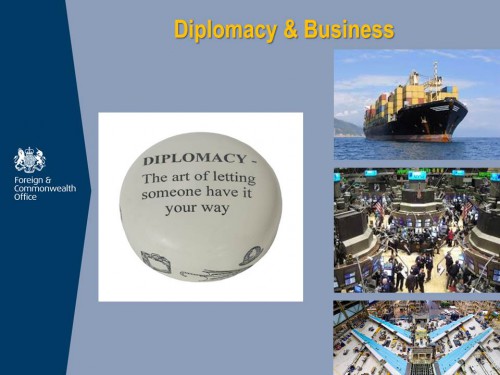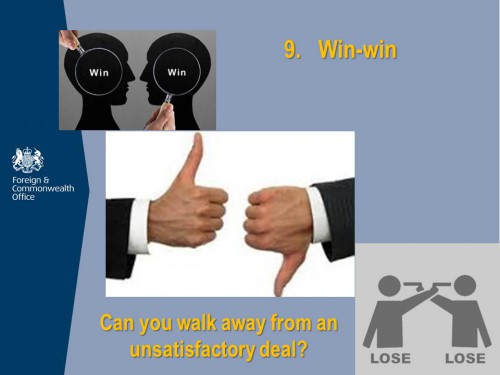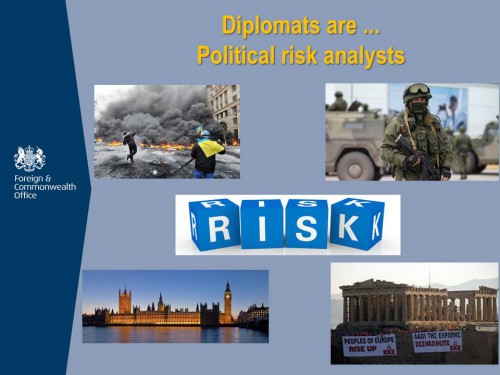12th June 2015
Diplomacy and business
Can others learn from diplomacy? I think they can, but so can diplomats learn from others.
I gave a presentation to a business group in Minsk, on “10 lessons of diplomacy” that might be useful for business. I picked on 10 as it seemed a good number. My brief was to entertain and provide some ideas for a business audience.
The write up of the event reported on only 7 “key skills” for successful business. I don’t know what happened to 3 of them. On reflection, I decided that the author was entitled to bin 3 of them. If they didn’t make sense to him, then why should he include them? “Business” is anyway a very broad term, so perhaps a strike rate of 7 in 10 wasn’t so bad!
The business of diplomacy
I sometimes describe diplomacy as the business of “political risk” –the identification, analysis and management of risks from other “polities” or countries. Companies can provide insurance against “political risk”, usually for financial investments in foreign countries where the investor is unsure about political stability.
As I explained to the audience, a diplomat’s key function is as a political analyst for our governments. We identify risks from internal instability, external military threat, or from political change such as elections. As important are risks from economic factors – so we must have a reasonable understanding of economics.
We use journalistic skills. So we investigate what is going on and listen to and report other people’s opinions. We need to write clearly and succinctly to explain events in other countries to colleagues at home. Ideally, we act as “futurologists”: we try to predict what might happen and how future events might affect our national interests.
We also do the reverse. We explain to other governments what our own government is doing and how our actions might affect them. We are also advocates to wider audiences like the media, businesses, and others with an interest in our countries. We often give speeches and presentations to promote our own countries.
We sometimes act as “travel agents”. We provide consular services to our citizens in foreign countries, and we used to issue visas to visitors to our countries. (We are now more business-like, and have out-sourced some services, such as accepting visa applications.)
But perhaps the most important element of our work is negotiating texts – of multilateral and bilateral treaties, agreements and other documents. These are the rules that we hope all will abide by to keep peace and stability around the world.
I joked that, as a business model, diplomacy isn’t particularly efficient. Diplomats spend relatively little time negotiating texts. Negotiations are focussed in places like New York, Geneva, Vienna and other cities, where international organisations are based and multilateral agreements are drawn up. We also negotiate on bilateral texts. Most diplomacy is talking to others to probe and test respective policies and plans so that when negotiations take place, they are carried out as efficiently and effectively as possible.
The 10 lessons (skills or tips)
So what were my 10 “lessons” that I spoke about?
- Make a good first impression: I wrote about this before (even diplomats have to repeat themselves to get their messages across!) People have expectations about ambassadors, and I think business representatives should think of themselves as ambassadors for their companies and its products.
- Be polite: diplomats are usually polite or “diplomatic”. It is part of the job to be polite and understand what is polite (or not) in other cultures. In business, I think it would be better to be polite if you are trying to persuade people to do a deal, even if not immediately but at some point in the future.
- Inquisitiveness: if you want to understand the motivations of others, what makes them tick and their interests, it helps if you take an interest. As I have noted before, being interested in foreign places and cultures is a pre-requisite for a good diplomat.
- Find the common ground: an essential in a good negotiation is to work out first what you agree on to focus on what you don’t. It helps build trust if you do so. The big difference with business is that companies can have much more of a choice of their business partners. Nations have to deal with other nations.
- Patience: I’ve written about this when answering about the emotions of being a diplomat. Patience is a virtue in all walks to life. Waiting for the right moment helps us all.
- Communicate: clarity about your product or business is important for all in our digital age. I think business people are better at being direct than diplomats, maybe because business is often about doing a deal quickly and there are few variables to agree – price, quantity and delivery of goods or services. Diplomats are cautious by nature because national interests are at stake, and they are often not easy to quantify. This led to me to:
- Use the right resources: I talked of finding the right balance between focussing your time on a problem, or using other resources (ie spending money) to resolve it. In business, costs tend to drive everything else. Diplomats don’t focus so much on cost because of the difficulty in quantifying interests. In business, it seems to me that deals are easier to agree because there are fewer, and more quantifiable, variables.
- Know your red lines: what can’t you accept, or where’s the line you can’t cross? I can’t remember when I first used the phrase, but we’ve used it in diplomacy for many years now. We sometimes talk about our “bottom line” in a negotiation. Good business people know exactly at what price they can strike a deal at, or where the break-even price is between making a profit or a loss.
- Have the win-win mentality: this should also be an essential element in good negotiation skills. If both sides in business win, then they tend to keep doing business together. This should be the case in diplomacy, but sadly too many countries see the world in terms of “the zero sum”, that if someone else wins, you lose.

- Seal the deal in writing: I joked that in business the equivalent of a treaty is a contract. If you write down what you’ve agreed, that should reduce doubt and disagreement.
And which ones weren’t reported? Numbers 7, 9 & 10.
I was asked at the end: what can diplomacy learn from business?
Part of my job includes giving support to British businesses, so I need to have an idea of their needs and interests. I’ve learnt from meeting them, and from training programmes that the Foreign Office has sent me on, that if you have a clear strategy and business plans, you are more likely to succeed.
In fact, we continually learn from business and, through such as outsourcing, we are using more business skills to deliver public services. I wonder whether we could learn more, for example from those companies that put a price on “political risk”. If we had a better idea of the costs of taking action, then we might seek other ways to reach our goals.
Diplomacy isn’t free. Diplomats like me need to be paid. We in turn need the economies of the countries we represent – and the businesses which make up our economies – to be thriving. So it is very much in my interest that businesses in Britain succeed. That’s a lesson that all diplomats should be very aware of.
